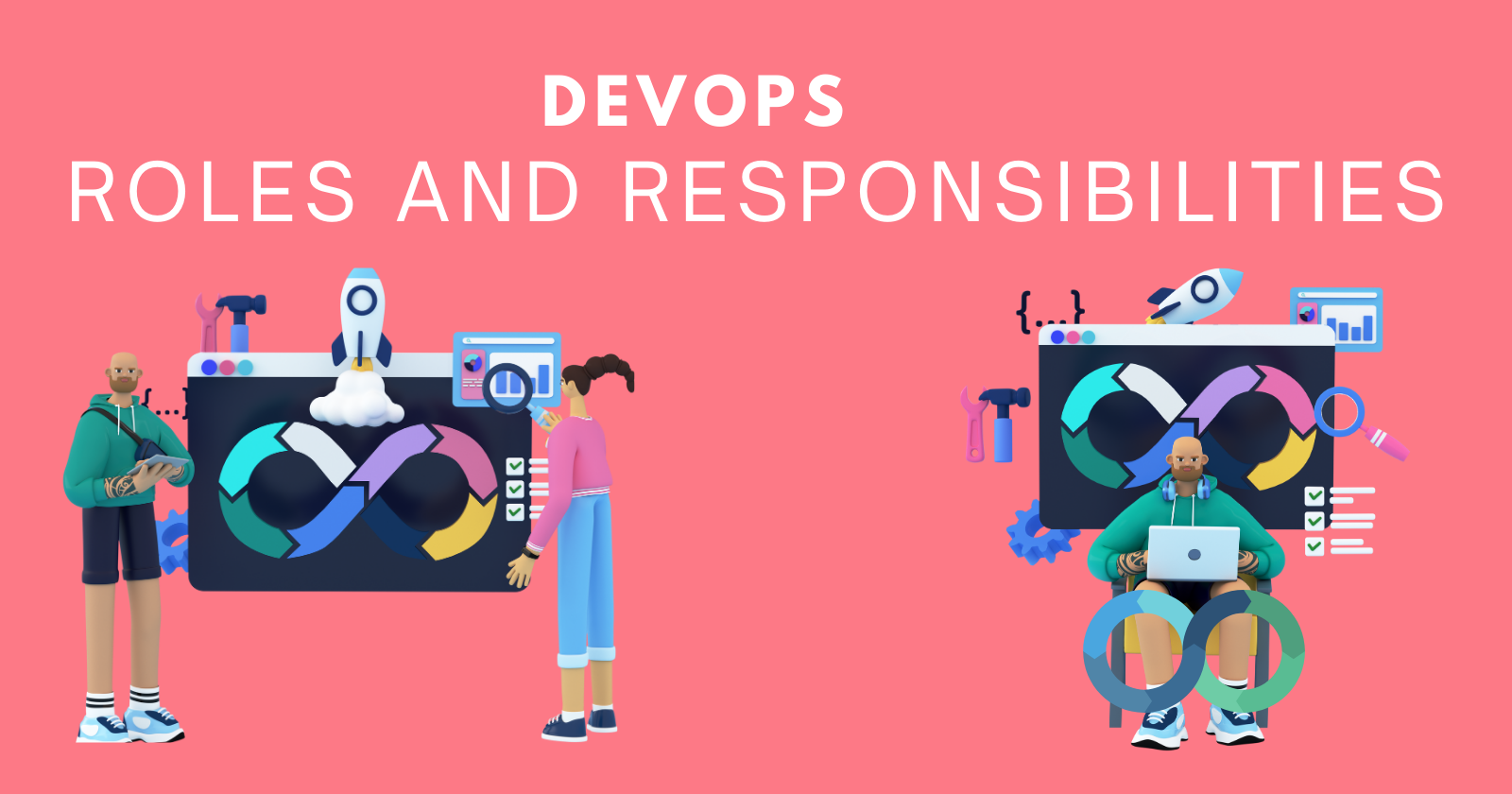Unlocking the Secrets of DevOps: Understanding Roles and Responsibilities
 Nikhil Chauhan
Nikhil Chauhan
Unlocking the Secrets of DevOps: Understanding Roles and Responsibilities
In today's rapidly evolving technological landscape, organizations are constantly searching for innovative ways to streamline their software development processes. Enter DevOps – a game-changing methodology that combines software development and operations, enabling organizations to deliver high-quality applications at an unprecedented speed.
However, implementing DevOps successfully requires a thorough understanding of the roles and responsibilities involved. In this article, we will delve into the secrets of DevOps and shed light on the key roles that make this methodology work seamlessly.
From the developers who write the code to the operations team responsible for deployment and monitoring, each role is crucial in the DevOps framework. We will explore the specific responsibilities of each role and how they collaborate to achieve continuous integration, continuous delivery, and continuous monitoring.
Whether you're a developer, operations professional, or simply interested in understanding how DevOps can revolutionize software delivery, this article will provide you with the essential insights you need to navigate the world of DevOps successfully.
Join us on this journey as we unlock the secrets of DevOps and empower you to build robust, efficient, and collaborative software delivery pipelines.
The DevOps culture and mindset
The success of DevOps lies not only in the technical aspects but also in the culture and mindset it promotes within an organization. DevOps is not just a set of tools or practices; it is a cultural shift that encourages collaboration, communication, and continuous improvement.
In a traditional software development environment, developers and operations teams often work in silos, leading to inefficiencies, delays, and a lack of accountability. DevOps, on the other hand, breaks down these barriers by fostering a culture of shared responsibility and collaboration.
The DevOps culture emphasizes the importance of cross-functional teams, where developers, operations professionals, and other stakeholders work together towards a common goal. This culture promotes transparency, trust, and open communication, enabling teams to identify and resolve issues quickly, leading to faster software delivery and higher customer satisfaction.
To adopt the DevOps mindset, organizations need to embrace the following key principles:
1. Automation: Automating repetitive and manual tasks allows teams to focus on value-added activities and accelerates the software delivery process. Automation also improves consistency, reduces errors, and enables faster feedback loops.
2. Continuous Integration and Continuous Delivery (CI/CD): Continuous integration involves merging changes from different developers into a shared code repository, followed by automated build and testing processes. Continuous delivery takes this a step further by automating the deployment and release of software to production environments. CI/CD practices ensure that software is continuously integrated, tested, and delivered, enabling organizations to respond quickly to market demands.
3. Monitoring and Feedback: Continuous monitoring plays a vital role in DevOps, as it provides valuable insights into the performance, availability, and security of applications. Monitoring tools allow teams to detect issues early, identify trends, and make data-driven decisions for continuous improvement. Feedback loops, both internal and external, help teams gather insights, validate assumptions, and iterate on their software, leading to better outcomes.
By embracing the DevOps culture and mindset, organizations can foster collaboration, increase agility, and deliver high-quality software faster than ever before.
Roles and responsibilities in DevOps
To fully grasp the secrets of DevOps, it is essential to understand the specific roles and responsibilities within a DevOps team. While the exact roles may vary depending on the organization and the size of the team, there are several key roles that are typically found in DevOps environments.
The role of a DevOps engineer
DevOps engineers play a pivotal role in the successful implementation of DevOps practices. They are responsible for bridging the gap between development and operations, ensuring smooth collaboration and efficient delivery of software.
Some of the key responsibilities of a DevOps engineer include:
- Infrastructure as Code (IaC): DevOps engineers use tools like Terraform or Ansible to define infrastructure as code, enabling the automated provisioning, configuration, and management of infrastructure resources. This helps achieve consistency, scalability, and reproducibility across environments.
- Continuous Integration and Continuous Delivery (CI/CD) pipelines: DevOps engineers design and maintain CI/CD pipelines, which automate the build, test, and deployment processes. They configure and integrate various tools to ensure seamless delivery of code changes, from development to production.
- Monitoring and troubleshooting: DevOps engineers set up monitoring systems to track application performance, availability, and security. They proactively identify and resolve issues, ensuring the reliable and efficient operation of the software in production environments.
- Collaboration and communication: DevOps engineers act as a bridge between development and operations teams, facilitating effective communication and collaboration. They work closely with developers and operations professionals to understand requirements, address challenges, and ensure smooth delivery.
The role of a software developer in DevOps
Software developers play a crucial role in the DevOps framework, as they are responsible for writing and maintaining the code that powers the applications. In a DevOps environment, developers are involved in the entire software delivery lifecycle, from design to deployment.
Here are some of the key responsibilities of a software developer in DevOps:
- Code development and version control: Developers write high-quality code, following best practices and coding standards. They use version control systems like Git to manage code changes, enabling collaboration and tracking of modifications over time.
- Test automation: Developers write automated tests to ensure the quality and stability of the codebase. These tests are integrated into the CI/CD pipeline, allowing for continuous testing and feedback.
- Collaboration and communication: Developers work closely with other members of the DevOps team, such as DevOps engineers and system administrators, to understand requirements, resolve issues, and deliver software efficiently.
The role of a system administrator in DevOps
System administrators, also known as operations professionals, are responsible for managing and maintaining the infrastructure and systems that support the software applications. They ensure that the underlying technology stack is reliable, secure, and scalable.
The key responsibilities of a system administrator in DevOps include:
- Infrastructure management: System administrators configure and manage the servers, networks, and storage systems that form the foundation of the software applications. They ensure that the infrastructure is properly provisioned, monitored, and maintained.
- Security and compliance: System administrators implement security measures to protect the applications and data from unauthorized access and cyber threats. They also ensure compliance with industry regulations and best practices.
- Deployment and release management: System administrators coordinate the deployment and release of software to production environments. They work closely with the development and DevOps teams to ensure smooth and efficient deployment processes.
- Monitoring and performance optimization: System administrators monitor the performance and availability of the infrastructure and systems, identifying and resolving issues to ensure optimal performance and reliability.
Collaboration and communication in DevOps teams
One of the secrets to successful DevOps implementation lies in effective collaboration and communication within the DevOps team. DevOps teams bring together individuals from different backgrounds and skill sets, and fostering collaboration is essential for achieving the goals of DevOps.
Effective collaboration in DevOps teams can be facilitated through the following practices:
1. Cross-functional teams: DevOps teams consist of individuals with diverse skill sets, including developers, operations professionals, and quality assurance specialists. By bringing together individuals from different areas, teams can leverage their expertise and work towards a common goal.
2. Shared responsibility: In a DevOps environment, everyone shares the responsibility for the success of the software delivery process. Collaboration is not limited to a specific team or individual; it extends across the entire organization, from development to operations.
3. Open communication: Transparent and open communication is crucial for effective collaboration. DevOps teams should encourage regular communication channels, such as daily stand-up meetings, to discuss progress, challenges, and potential improvements.
4. Knowledge sharing: DevOps teams should promote a culture of continuous learning and knowledge sharing. This can be done through documentation, training sessions, and cross-training initiatives, enabling team members to gain a deeper understanding of different roles and responsibilities.
By fostering collaboration and communication, DevOps teams can break down silos, streamline processes, and deliver software with greater efficiency and quality.
Tools and technologies for DevOps
DevOps relies on a wide range of tools and technologies to support the software delivery process. These tools automate tasks, enable collaboration, and provide visibility into the software development lifecycle.
Here are some of the commonly used tools and technologies in DevOps:
- Version control systems: Git, Subversion, and Mercurial are popular version control systems that enable teams to manage code changes, track modifications, and facilitate collaboration.
- Continuous Integration/Continuous Delivery (CI/CD) tools: Jenkins, GitLab CI/CD, and CircleCI are examples of CI/CD tools that automate the build, test, and deployment processes. These tools integrate with version control systems and other development tools to ensure seamless delivery.
- Configuration management tools: Tools like Ansible, Puppet, and Chef enable the automated provisioning, configuration, and management of infrastructure resources. They help maintain consistency, scalability, and reproducibility across environments.
- Containerization and orchestration tools: Docker and Kubernetes are widely used containerization and orchestration tools that enable the packaging and deployment of applications in lightweight, isolated environments. They provide scalability, portability, and resource efficiency.
- Monitoring and logging tools: Tools like Prometheus, Grafana, and ELK stack (Elasticsearch, Logstash, Kibana) are used for monitoring application performance, analyzing logs, and gaining insights into the behavior of the software in production environments.
These are just a few examples of the vast array of tools and technologies available for DevOps. The choice of tools depends on the specific requirements of the organization and the project, and teams should evaluate and select the tools that best suit their needs.
Conclusion
In conclusion, DevOps is a powerful methodology that combines software development and operations to deliver high-quality applications at an unprecedented speed. Understanding the roles and responsibilities within a DevOps team is essential for successful implementation.
From DevOps engineers who bridge the gap between development and operations to software developers who write and maintain the code, each role plays a crucial part in the DevOps framework. Collaboration, communication, and the adoption of a DevOps culture and mindset are key to unlocking the secrets of DevOps.
By embracing DevOps principles, leveraging the right tools and technologies, and fostering effective collaboration, organizations can build robust, efficient, and collaborative software delivery pipelines. The secrets of DevOps are within reach – it's time to unlock them and revolutionize your software delivery process.
Subscribe to my newsletter
Read articles from Nikhil Chauhan directly inside your inbox. Subscribe to the newsletter, and don't miss out.
Written by

Nikhil Chauhan
Nikhil Chauhan
Web developer, Content writer, Looking for career opportunities as DevOps Engineer